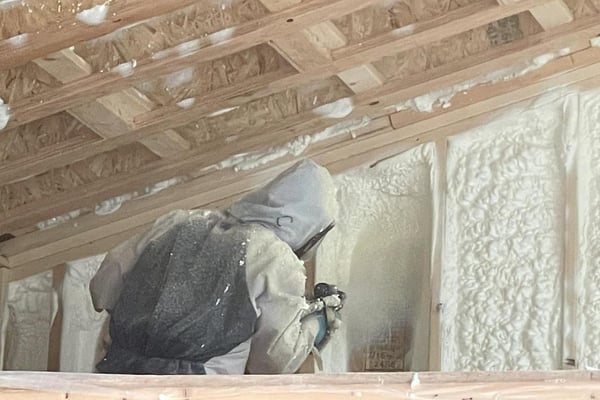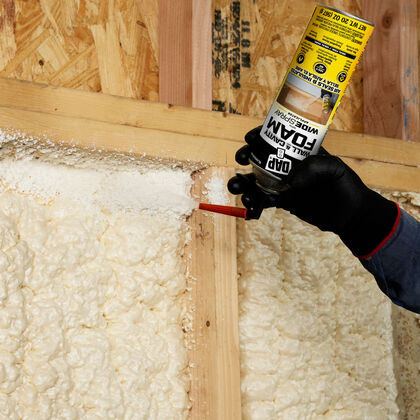Understanding the Benefits of Using Spray Foam for Insulation Projects
Understanding the Benefits of Using Spray Foam for Insulation Projects
Blog Article
Spray Foam: The Ultimate Option for Air Sealing and Insulation
Spray foam insulation has become a leading remedy for effective air securing and thermal insulation, supplying a distinct combination of buildings that set it in addition to standard methods. Its ability to expand and fill up gaps makes it specifically efficient in stopping air leak, which can substantially affect power efficiency. Understanding the complete range of its benefits, installation procedures, and comparisons with other insulation types is vital for making informed choices. As we discover these elements, the implications for both brand-new building and constructions and retrofits end up being progressively substantial. What variables should influence your option?
What Is Spray Foam?
Spray foam is a versatile insulation material that integrates the principles of air sealing and thermal resistance to boost power effectiveness in structures. Composed mostly of polyurethane or other comparable substances, spray foam is applied as a liquid that broadens upon call with surfaces, producing a strong, continual layer of insulation. This unique building allows it to fill up voids, fractures, and voids that standard insulation products may neglect, offering a superior air seal.
There are two main sorts of spray foam: open-cell and closed-cell. Open-cell spray foam is lighter and extra versatile, using outstanding sound absorption and a reduced R-value per inch - Spray Foam. In contrast, closed-cell spray foam is denser, giving a higher R-value, wetness resistance, and added architectural integrity to constructing elements
The application procedure normally entails specialized tools, making sure a smooth application that follows numerous substratums, including steel, timber, and concrete. This flexibility makes spray foam ideal for both brand-new building and constructions and retrofitting existing structures. Its capacity to produce an airtight barrier considerably adds to minimizing power consumption and enhancing interior air high quality, thereby making it a preferred selection among contractors and property owners alike.
Advantages of Spray Foam Insulation
Among the most substantial benefits of spray foam insulation is its phenomenal capacity to develop a continuous air obstacle, which effectively reduces power loss. Unlike standard insulation materials, spray foam expands to load cracks and voids, making certain that air leakage is significantly decreased. This characteristic not only improves energy performance however additionally leads to decrease utility bills gradually.
In addition, spray foam insulation offers exceptional thermal resistance, contributing to a more steady indoor atmosphere. Its high R-value per inch allows for efficient insulation in confined areas, making it optimal for attic rooms, walls, and crawl spaces. The moisture-resistant residential properties of spray foam help prevent mold and mildew and mildew growth, advertising much healthier living problems.
Another vital benefit of spray foam insulation is its sound-dampening qualities (Spray Foam). It effectively minimizes sound transmission between areas, producing a quieter and more comfy home atmosphere. The toughness of spray foam likewise stands apart, as it does not droop or resolve in time, preserving its performance throughout its life-span
Just How Spray Foam Functions
Comprehending just how spray foam insulation works is vital for appreciating its performance in air securing and thermal resistance. Spray foam insulation is composed of two main elements: isocyanate and polyol resin. When these components are combined, they go through a chemical response that creates the product to expand quickly, producing a dense foam that fills tooth cavities, fractures, and gaps.
As the foam broadens, it abides by surface areas, creating an impermeable seal that dramatically minimizes air infiltration. This particular makes spray foam insulation highly efficient at protecting against drafts and dampness penetration, which can result in energy loss and damage over time. Additionally, the closed-cell variation of spray foam offers premium thermal resistance because of its rigid framework, effectively reducing warmth transfer.
The unique residential properties of spray foam enable it to adapt uneven surfaces, ensuring thorough insurance coverage and a seamless barrier. Consequently, spray foam insulation not just enhances energy efficiency however also adds to improved indoor air top quality by reducing the buildup of irritants and pollutants. Ultimately, understanding the auto mechanics behind spray foam highlights its duty as a premium choice for insulation and air securing in both domestic and business applications.
Setup Process Review

Before setup, the space needs to be appropriately cleansed and prepped, making certain that surface areas are without particles, moisture, and dirt. Due to the fact that contaminants can endanger attachment and general performance, this step is important. When the location is prepared, the application entails blending the 2 elements of the spray foam, which increases upon get in touch with and fills up voids efficiently.
Educated specialists must carry out the setup, using specialized devices to make certain uniform protection and optimum thickness. Security preventative measures, including using safety equipment and guaranteeing correct ventilation, are critical during this procedure. After application, the foam commonly remedies swiftly, developing a strong barrier that enhances energy effectiveness.
Comparing Spray Foam to Traditional Insulation
When examining insulation choices, spray foam insulation stands out in contrast visit site to standard products such as fiberglass and cellulose. Unlike fiberglass and cellulose, which can enable air infiltration, spray foam broadens upon application, filling gaps and voids to produce a closed seal.
Furthermore, spray foam gives a higher R-value per inch than standard insulation types, providing more efficient thermal resistance in a thinner profile. This characteristic is especially advantageous precede with minimal dental caries deepness. In addition, spray foam is resistant to wetness and mold growth, which can be a significant issue with cellulose and fiberglass, specifically in humid atmospheres.
Nevertheless, spray foam insulation normally carries a greater ahead of time price than its typical equivalents. Home owners should evaluate this first financial investment against long-term power savings and performance benefits. Ultimately, while both insulation kinds serve their purpose, spray foam emerges as an extra innovative solution for modern insulation demands, particularly in terms of air securing and thermal performance.

Conclusion
In recap, spray foam insulation stands for an extremely efficient service for achieving here optimum air sealing and thermal resistance. Its distinct residential or commercial properties, including wetness resistance and sound dampening, make it suitable for numerous applications in both new constructions and retrofitting projects (Spray Foam). The initial prices may be greater compared to typical insulation products, the long-term advantages, such as substantial power savings and improved indoor air top quality, justify the investment and highlight its value in modern-day structure practices.
Spray foam insulation has arised as a leading solution for reliable air sealing and thermal insulation, supplying an unique mix of buildings that establish it apart from typical approaches.Spray foam is a functional insulation material that combines the concepts of air securing and thermal resistance to improve energy efficiency in structures.When assessing insulation choices, spray foam insulation stands out in contrast read this post here to typical materials such as fiberglass and cellulose. Eventually, while both insulation types serve their function, spray foam arises as a more innovative remedy for modern insulation requirements, especially in terms of air securing and thermal effectiveness.
In recap, spray foam insulation stands for an extremely effective option for achieving ideal air securing and thermal resistance.
Report this page